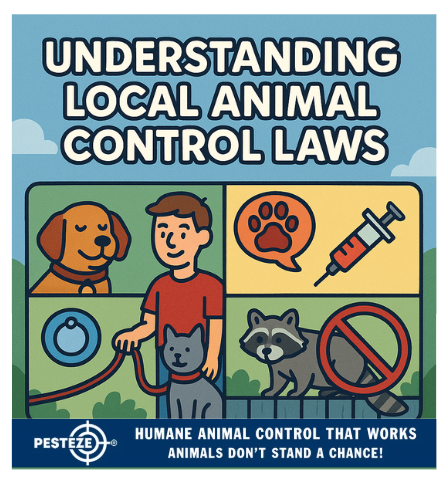UNDERSTANDING LOCAL ANIMAL CONTROL LAWS

UNDERSTANDING LOCAL ANIMAL CONTROL LAWS
SUMMARY
Animal control laws are designed to protect both people and animals. This guide explains the basics of local regulations, what responsibilities pet owners have, and how to stay compliant with community rules.
FEATURES
-
Pet licensing requirements: Registering pets with local authorities.
-
Leash and containment laws: Rules for keeping pets under control.
-
Vaccination mandates: Protecting pets and public health.
-
Noise ordinances: Addressing nuisance issues like barking.
-
Wildlife regulations: Guidelines for handling or reporting wild animals.
-
Enforcement and penalties: Consequences of non-compliance.
GUIDE DESCRIPTION
Every community has rules in place to balance human safety, animal welfare, and neighborhood harmony. Learning about local animal control laws helps pet owners and residents avoid legal issues while fostering a safe environment.
One of the most common rules is pet licensing requirements. Many cities require cats and dogs to be licensed and wear tags. Licensing helps authorities track vaccination records, identify lost pets, and enforce ownership responsibilities.
Another key area involves leash and containment laws. Most municipalities mandate that pets must be kept on a leash when off private property. Fenced yards or secure enclosures may also be required to prevent animals from roaming freely, which can reduce accidents, bites, and property damage.
Vaccination mandates are also standard. Rabies vaccinations are legally required in many regions to protect both pets and humans. Some areas may require additional vaccinations or proof of veterinary care to maintain licensing.
Communities also address nuisances through noise ordinances. For example, repeated loud barking may violate local rules and result in fines or warnings. These laws aim to reduce disturbances while encouraging responsible pet ownership.
Wildlife regulations are another critical component. Residents are often prohibited from trapping, relocating, or harming wild animals without permission. If a raccoon, skunk, or bird becomes a problem, local animal control should be contacted for safe and legal handling.
Failure to comply with these laws can lead to enforcement and penalties. Depending on the violation, pet owners may face warnings, fines, loss of pet custody, or even criminal charges in severe neglect or cruelty cases.
Understanding and following local animal control laws not only prevents legal issues but also improves the safety and wellbeing of both people and animals in your community. When in doubt, contact your local animal control office or government website for specific guidelines.
- Saneeth Thota


Comments 0